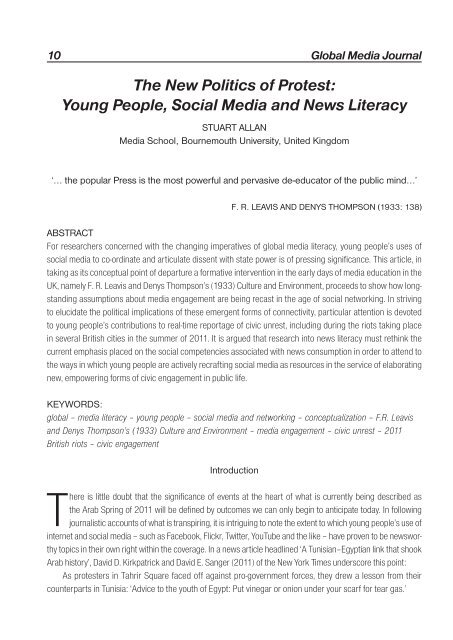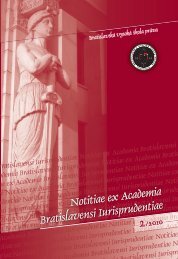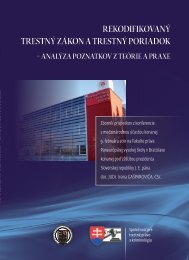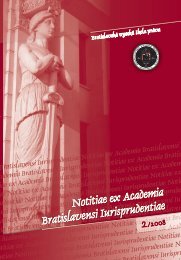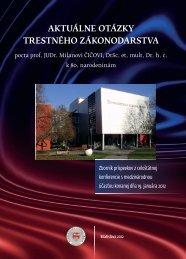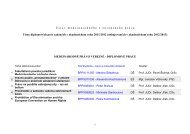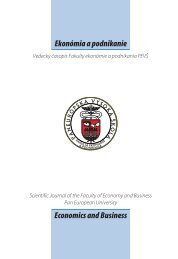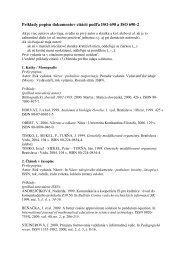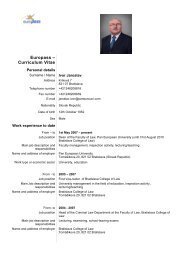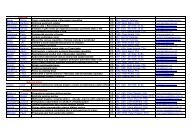ÄÃslo 1/2013 - Paneurópska vysoká Å¡kola
ÄÃslo 1/2013 - Paneurópska vysoká Å¡kola
ÄÃslo 1/2013 - Paneurópska vysoká Å¡kola
You also want an ePaper? Increase the reach of your titles
YUMPU automatically turns print PDFs into web optimized ePapers that Google loves.
10<br />
Global Media Journal<br />
The New Politics of Protest:<br />
Young People, Social Media and News Literacy<br />
Stuart Allan<br />
Media School, Bournemouth University, United Kingdom<br />
‘... the popular Press is the most powerful and pervasive de-educator of the public mind...’<br />
F. R. Leavis and Denys Thompson (1933: 138)<br />
Abstract<br />
For researchers concerned with the changing imperatives of global media literacy, young people’s uses of<br />
social media to co-ordinate and articulate dissent with state power is of pressing significance. This article, in<br />
taking as its conceptual point of departure a formative intervention in the early days of media education in the<br />
UK, namely F. R. Leavis and Denys Thompson’s (1933) Culture and Environment, proceeds to show how longstanding<br />
assumptions about media engagement are being recast in the age of social networking. In striving<br />
to elucidate the political implications of these emergent forms of connectivity, particular attention is devoted<br />
to young people’s contributions to real-time reportage of civic unrest, including during the riots taking place<br />
in several British cities in the summer of 2011. It is argued that research into news literacy must rethink the<br />
current emphasis placed on the social competencies associated with news consumption in order to attend to<br />
the ways in which young people are actively recrafting social media as resources in the service of elaborating<br />
new, empowering forms of civic engagement in public life.<br />
Keywords:<br />
global – media literacy – young people – social media and networking – conceptualization – F.R. Leavis<br />
and Denys Thompson’s (1933) Culture and Environment – media engagement – civic unrest – 2011<br />
British riots – civic engagement<br />
Introduction<br />
There is little doubt that the significance of events at the heart of what is currently being described as<br />
the Arab Spring of 2011 will be defined by outcomes we can only begin to anticipate today. In following<br />
journalistic accounts of what is transpiring, it is intriguing to note the extent to which young people’s use of<br />
internet and social media – such as Facebook, Flickr, Twitter, YouTube and the like – have proven to be newsworthy<br />
topics in their own right within the coverage. In a news article headlined ‘A Tunisian–Egyptian link that shook<br />
Arab history’, David D. Kirkpatrick and David E. Sanger (2011) of the New York Times underscore this point:<br />
As protesters in Tahrir Square faced off against pro-government forces, they drew a lesson from their<br />
counterparts in Tunisia: ‘Advice to the youth of Egypt: Put vinegar or onion under your scarf for tear gas.’<br />
GMJ Book.indb 10 21.1.<strong>2013</strong> 9:44


